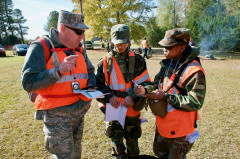Staff Sections
Main Content
Composite Squadron of the Waxhaws Conducts Inaugural Emergency Services Training
North Carolina Wing Chaplain Major Shannon Maness (left) works with C/MSgt Dustin Hurst of the Composite Squadron of the Waxhaws and C/SSgt Jacquel Holloway of the Pitt-Greenville Composite Squadron during the land navigation phase of the Waxhaws Emergency Service Training weekend. Photo Credit: 1st Lt H.J. Bentley III, CAP (click image to view full size)
Museum of the Waxhaws serves as ES training site
12/4/2017–WAXHAW, NC–More than 25 Civil Air Patrol (CAP) cadets and 10 senior members from four squadrons reported to the Museum of the Waxhaws as part of the inaugural Waxhaws Emergency Services Training weekend or WEST.
The three-phase training program is based on the Alabama Wing's Emergency Services School or WESS.
WESS was originally started by CAP's Director of Operations, Lt Col John Desmarais, in 1997 as a test-site for the National Emergency Services Curriculum and National Ground Search and Rescue (NGSAR) School. Since then, WESS has grown to become one of the longest running CAP ground team task training programs. Members from the six wings of the Southeast Region have participated in this program, as well as numerous other wings around the nation.
“I’m really proud that we could learn this training and bring it back to the North Carolina Wing,” said 1st Lt Patricia Allen, Squadron Commander of NC-300, the Composite Squadron of the Waxhaws. “This course is based on the WESS program started twenty years ago and we intend to continue improving and building our program.”
Phase one began on 22 September 2017 and included First Aid, ICUT, land survival and intro to shelter building. Phase two began on 17 November 2017 and included land navigation, pace count, hasty search techniques, line search techniques, a land navigation practical exercise as well as a mass casualty exercise.
Phase three is scheduled for 18 January 2018 and will consist of a direction-finding exercise, scene security training and a practical exam combining all three phases for graduation.
“This all began three years ago and now we’ve gained enough knowledge and experience to be able to bring this course to the North Carolina Wing and to train and qualify our members in operational specialties based on the national standard,” said Maj Grace Carnes, Deputy Commander of NC-300.
This training even utilized moulage techniques to better equip CAP personnel to deal with actual trauma and triage. Very life-like or real-to-the-eye injury simulations increases the knowledge and performance of responders. The moulage artists for this phase of training were 2d Lt Tracy Dunbar, the Deputy Commander for Cadets, and C/Lt Col Casey Carnes. “I got my start with moulage about 10 years ago making realistic zombie make up for my son at Halloween and it morphed into making some realistic injuries to help give a touch of realism to our training,” said Lt Dunbar.
Lt Dunbar went on to say, “I think this training builds confidence and self-sufficiency, a fundamental building block in preparing cadets to take on the challenges which lie ahead not only in this training but in life in general.”
Upon conclusion of this training, both Lt Allen and Maj Carnes intend to have the graduates return as the next cadre of instructors for next year's Waxhaws Emergency Services Training.
Sub Content
- My Account
- Member Login
- Register for an account
Search
- Recent Articles
- Cunningham Field Composite Squadron Hosts Air Operations Training and Familiarization
- NC Wing CyberPatriot Preliminary State Award Winners Announced
- Tar River Composite Squadron Cadets Compete in CyberPatriot Competition
- Civil Air Patrol Remembers Veterans for Christmas
